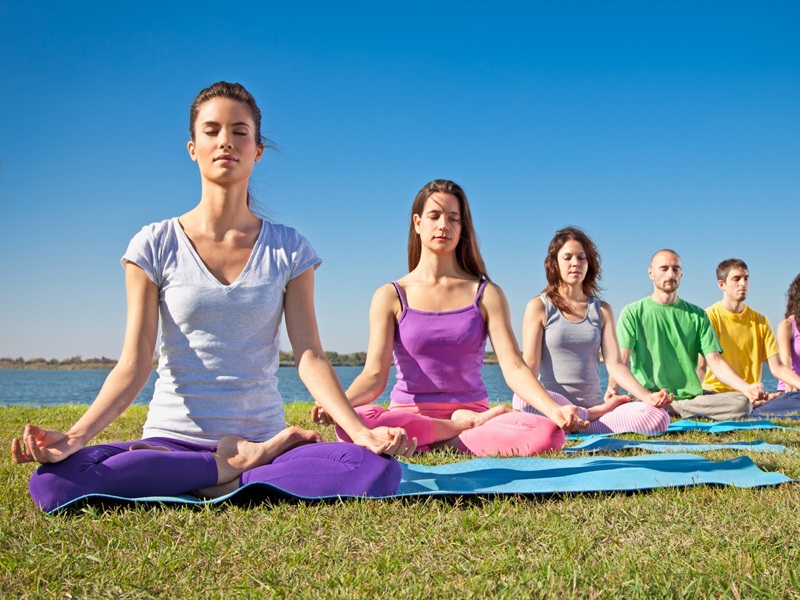9 Simple Meditation Tips for Beginners of All Ages
By Newsmeter Network
Meditation has always been the best technique to restore our mindfulness; A technique in use for centuries now. In the new era, running back and forth in this rat race, we often tend to forget about our mental health. Somewhere along the line, we are putting our inner peace and mindfulness on stake, which is resulting in an increasing rate of stress, anxiety, and depression. How to get rid of this stress? Glance through to know the best benefits and simple meditation tips for beginners.
What is Meditation?
Meditation is an approach to train our minds, just as exercise is to train our bodies. It is a practice that came into existence, around centuries ago, to deepen and contemplate the mystical forces of life and find a deeper meaning of it. These days, meditation has become a vital practice in stress reduction and relaxation. It includes various techniques such as; mindfulness, a thought, or an attempt to train self-awareness.
Meditation isn't about becoming a different, new, or even better version of yourself. It's about understanding your thoughts and feelings, which pass through the window of your mind. Just staying still and observing them, without judging. Eventually, you will start to understand them well, feeling close to your conscience. Sitting still and focusing on your thoughts, with an "empty mind," may seem complicated for beginners. Well! Worry not! We have some simple tips for beginners like you. Before we tell you what, let's first understand the benefits of meditation.
Benefits of Meditation:
Meditation has the power to give you a sense of peace, serenity, and balance between both the mind and the body. And these benefits don't just come to a halt with your meditation sessions. Still, it slowly brings up a positive change helping you accelerate your emotional well-being and overall health. Here are a few more best benefits of practicing meditation.
1. Bid Farewell to Your Stress Ball:
Today, 7 out of 10 people are suffering from stress or stress-related disorders in their day-to-day life. Stress may outwardly seem insignificant, but it leads to an enormous amount of mental and physical agony.
Stress causes an increase in the levels of a hormone called Cortisol, generally known as the stress hormone. The increase in this hormone thereby results in the release of inflammatory-promoting chemicals, namely, Cytokines. These changes in the effect of sleep promote anxiety and depression and cause fatigue and restlessness.
In an 8-week study, few individuals practiced a meditation style called "mindfulness meditation," which concluded to have reduced the inflammation response, which caused stress. Researches have also shown that meditation may also help in curing stress-related disorders like irritable bowel syndrome, PTSD, and Fibromyalgia.
2. Promotes Emotional Health:
Meditation helps you stay still, bringing your whole body to a halt, seizing all your restlessness. It expects us to let our thoughts and feelings fly freely, just like the birds do in an open sky. No chaos, no worries, it's just you and your thoughts, where you let them pass without judgment.
Due to stress, certain inflammatory chemicals are released, which can affect the mood and lead to depression. Studies show that meditation reduces depression by decreasing the production of these chemicals and leading to a calm and peaceful mental disposition. Therefore, creating a positive outlook over life.
Also Read: Sun Salutations Benefits
3. "Attention!":
One of the biggest and the most challenging task for anyone meditating is paying attention to one's thoughts. Our mind, when it is still, often wanders, thereby making it a humongous task to focus one's attention on a particular object. It is like weight lifting for your attention span. The more you practice it, the stronger it grows. Meditation helps in reorienting and maintain the attention span.
4. Cures Memory Loss:
Improvements in focusing and broadening of the attention span, keep the brain activate and stimulated. Kirtan Kriya is one such technique of meditation that combines the repetitive chanting and motion of fingers to focus thoughts.
5. Enhances Optimism:
Some types of meditations kindness and confidence in individual practicing. Researchers found out that meditation arouses positive feelings towards yourself and also towards others. It helps in building a positive behavior in your life but also helps to have harmony in your personal life. It implies that meditation helps in overcoming social anxiety, compatibility conflicts, and help in anger management.
Also Read: Yoga To Increase Immunity
6. Helps Fight Addiction:
Meditation not just helps in building mental stability and serenity, but it also helps in the building of spiritual discipline. It helps you in enhancing self-control and thereby helping to seize the urge for addiction. Meditation helps in improving the will power and help you avoid the trigger for unwanted stimuli. It aids in food cravings and other craving-related diseases.
7. Improves Sleep:
Five people out of 10 have insomnia at some point or the other in their life. Studies also concluded that people who meditate regularly fall asleep sooner than the people who didn't. Meditation results in a drain of unwanted thoughts, which helps you fall asleep faster, and by redirecting or controlling those thoughts.
Here are quick tips for you to get started with your stress-relief mantra!
How to Do Meditation Tips for Beginners:
1. What to Do Before Meditation:
- Start Early-
Try to inculcate the habit of meditation has the first thing you do after you wake up in the morning. Before you are occupied by your "To-Do" for the day, make sure you detox all your thoughts at the dawn of the day and start anew. So that you can start your day with a bang!
- Fix a spot, fix a time-
Make sure that you meditate at the same time in the same place.
Make this commitment every day in the morning until it gets embedded in your routine.
- Be creative about your location-
Experts say that meditating in the same spot helps in building up consistency. But, sometimes, it's highly impossible. The same place, every day, may seem mundane. Then, we can take all the liberty to get a little creative and move out of our space. The most beautiful thing about meditation is that it can be done anywhere- at home, at the park, at work. So, find your space. All you got to do is close your eyes and let it sink in.
Also Read: Benefits Of Surya Mudra
- You don't have to sit Cross-legged to enjoy the perks of Meditation Mantra-
The one thing that comes to our mind when we think of meditation is the cross-legged posture. That's a conventional image that almost all of us carry around. Sit cross-legged if you are not comfortable with it. The most important thing in meditation is to find the position in which you are comfortable. If you want to sit or lie comfortably, it's all up to you.
- Find the best Position for You-
Choose any posture that is easy and comfortable for you. Don't force yourself to either sit up too straight or up too tight. You can sit or lie as per your convenience. The ideal position for most of the people, is somewhere between sitting on a couch, with a cushion or towel rolled up underneath the back; the back is naturally upright.
2. During Meditation:
- Get used to Effortless Breathing-
Meditation involves focusing on the breath, which helps in anchoring one's consciousness to the mind. Even though never make an effort to control your breathing. Let be natural and focus on the rhythm of your breath, and the rising and falling sensation that creates in your body.
- Get Comfortable with the Discomfort-
The people who have just started meditating, the beginners, might find it difficult to sink in with the silence and stillness of their mind and body. People practicing meditation for years might face discomfort like restlessness, anxiety, and irritation while practicing meditation. Over time, you will learn how to capture these negative emotions and redirect them so that they don't affect your focus and attention towards your mind. And this is called mindfulness.
- Carry on the Mindfulness with you for the Rest of your Day-
Just before you wrap up your session, go about your day and form a clear idea as to how you are going to go about the day. It's as if you are drawing your day on a plain canvas, giving yourself a clear idea about how you are going to about your day. In this way, whatever tasks that you have analyzed during your session in the morning, make sure you perform them in the same way.
3. After Meditation:
- Carry a spark of positivity-
After you have completed your session, make sure that you hold a guard of your thoughts, and allow only the positive and pleasant feelings in your headspace. With this, your mind will be free from all the heavy negative thoughts, which are now occupied by very serene and productive positive views.
Meditation is an art. An art that teaches us how to live and hold guard our emotions. It helps us in genuinely finding our inner self and inner peace, which we often tend to lose in this real world. Out of the 24 hours that we have in the day, we need to take out a few minutes for our mental health, to nourish it, to make sure that we are safe and sound. With an increasing rate of stress and anxiety these days, meditation is the cheapest medicine that we often turn a blind eye. Follow the tips we shared with you and make your life even more significant, better, and beautiful. Write back to us with your experiences.
